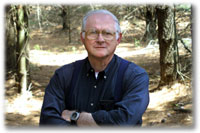It is often said that a picture is worth a thousand words. For me, a picture is also worth many stories, stories that may not have been told for many years. A couple weeks
ago, my brother Donald and I gazed at the picture of the home farm’s buildings. It was an aerial photo taken in the late 1950s, after my two brothers and I had left the farm, but our father and mother continued farming.
We looked at the photo of the old
barn, really two barns in one. We had
moved the larger barn to the farm shortly after World War II. What a task it was to move a barn of that
size. Pa had purchased the barn from
near Heffron, which was about five miles north of our place. Don and I talked about how we spent several days
trimming back tree limbs along the country roads where we would haul the
barn. Not an easy task. Then we talked about the day that the barn
was moved. The mover had attached wheels
to the corners of the big structure, and then with his truck along with our
Farmall H tractor and our neighbor, Bill Miller’s John Deere B, we pulled the
huge barn—it took up the entire road—from Heffron to our farm. It moved along at about three miles an hour. And what a sight to see. A barn moving down the road.
We noticed the big straw stack just
beyond the barn, and commented that that the photo had been taken shortly after
we had threshed. This brought back
memories of threshing machines and threshing dinners, and moving from farm to
farm during threshing season. Pa and
Bill Miller owned a threshing machine together, so we had first had experience
with that complicated machine with its pulleys and belts running every which
way. We remembered how important the
straw stack was to our dairy farm operations, as the straw providing bedding
for the cows that remained in the barn throughout our long, cold Wisconsin
winters.
We commented on the brooder house,
just west of the barn, where we started all the baby chicks that arrived each
spring by train. We looked at the machine
shed on the west side of the farmstead, with its crooked doors built by a
carpenter who had celebrated a bit too much the night before he worked on our
shed.
So many stories buried in one
picture. Stories of farm life in
the1950s, when there were family farms everywhere. Now, all but a handful of them are gone.
THE OLD TIMER SAYS: So many stories
from old photos—stories that should be told, and remembered.
WHERE
TO BUY MY BOOKS
To learn more about family farms, see Wisconsin Agriculture: A History. Buy from
your local bookstore, or buy online from the
Wisconsin Historical Society bookstore, https://shop.wisconsinhistory.org/books, bookshop.org, or purchase from the Friends of the Patterson
Memorial Library in Wild Rose—a fundraiser for them. Phone: 920-622-3835 for
prices and ordering, or contact the librarian: barnard@wildroselibrary.
Patterson Memorial Library
500 Division Street
Wild Rose, WI 54984.
www.wildroselibrary.org
If you live in the
western part of the state, stop at Ruth’s home town, Westby, visit
Dregne’s. and look at their great
selection of my books. Order a book from them by calling 1-877-634-4414. They
will be happy to help you. If you live
in northcentral Wisconsin, stop at the Janke bookstore in Wausau (phone
715-845-9648). They also have a large
selection of my books.


No comments:
Post a Comment